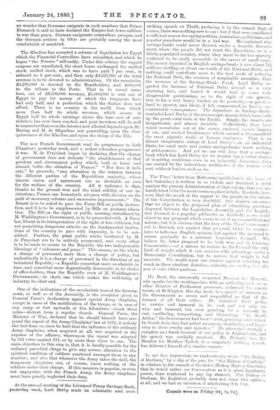The new French Government read its programme to both Chambers
yesterday week, and a rather colourless programme it was. M. de Freycinet began by declaring that the change of government does not indicate "the abandonment of that prudent and circumspect policy which, both at home and abroad, befits the situation of France." "Nor does it indi- cate," he proceeds, " any alteration in the relation between the different parties of the Republican majority, whose sincere union and agreement are as desirable as ever for the welfare of the country. All it indicates is that, thanks to the ground won and the tried solidity of our in- stitutions, France can henceforth advance with decision on the path of necessary reforms and successive improvements." The Senate is to be asked to pass the Ferry Bill on public iustruc- tion, and it is to be supplemented by Bills on primary educa- tion. The Bill on the right of public meeting, introduced by M. Waddington's Government, is to be proceeded with. A Press law, liberal in its interpretation of the right of free criticism, but not permitting dangerous attacks on the fundamental institu- tions of the country to pass with impunity, is to be sub- mitted. Further, the great public works instituted by M. ,de Freycinet are to be actively prosecuted, and every effort is to be made to secure to the Republic the two indispensable blessings of " calmness and peace." This means, on the whole, a change of personnel, more than a change of policy, but undoubtedly it is a change of personnel in the direction of an industrial Republic,—a Republic somewhat more secularistic in tone, and somewhat more dogmatically democratic in its choice of office-holders, than the Republic even of M. Waddington's Government,—in short, one which makes the well-being of industry its chief end.


































 Previous page
Previous page